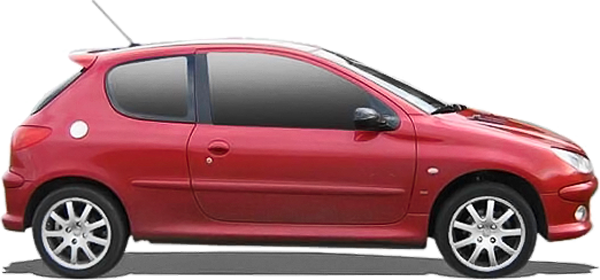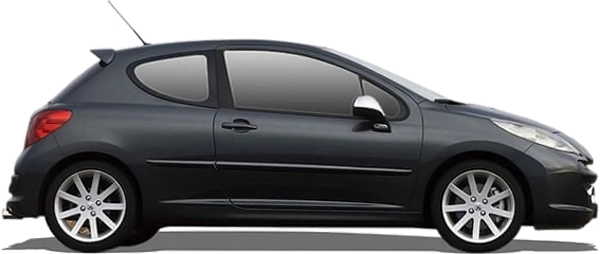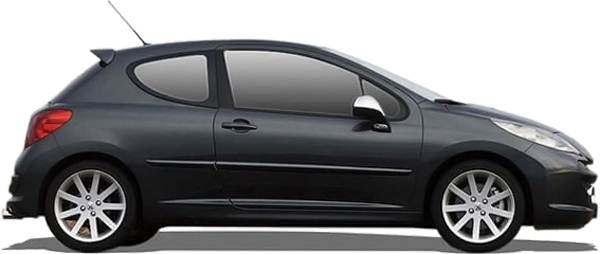The Comparative Analysis :
Peugeot 206 75 (09 - 10) vs. Peugeot 207 HDi FAP 90 (09 - 10)
€ 12,600

€ 14,900

€ 12,600
Base Price ⓘBase price of a new vehicle with standard equipment in Germany at market launch.
€ 14,900
ⓘBase price of a new vehicle with standard equipment in Germany at market launch. Price Info
Vehicle Dimensions
The 206 75 is considerably smaller in every dimension. It's 6.2 inches shorter, 3.1 inches narrower and 1.1 inches lower than the 207 HDi FAP 90.
206 75
207 HDi FAP 90
56.9
65.7
74.9
58
68.8
77.6
65.7 in
Width
68.8 in
74.9 in
Width Incl. Mirrors
77.6 in
56.9 in
Height
58 in
96.2
152.4
100
158.7
152.4 in
Length
158.7 in
96.2 in
Wheelbase
100 in
Vehicle Weight
206 75
207 HDi FAP 90
2240 lb
Curb Weight
2857 lb
3133 lb
Gross Vehicle
Weight
Weight
3796 lb

Weight Difference:
617 lb
21.59 %

General
206 75
207 HDi FAP 90
2*
Generation
W*
Hatchback
Car Body Style
Hatchback
Mid-Grade Unleaded
Fuel Type
Diesel

Front-wheel drive
Drivetrain
Front-wheel drive

5-speed manual transmission
Transmission
5-speed manual transmission
Engine
206 75
207 HDi FAP 90
Straight-four gasoline engine (naturally aspirated engine)
Engine Type
Straight-four diesel engine with turbocharger
2
Valves
4
4
Cylinders
4
1.4 L / 69 cu in
Displacement
1.6 L / 78 cu in
74 hp
at 5500 rpm
Power
89 hp
at 4000 rpm
206 75
74 hp
89 hp
207 HDi FAP 90
89 lb‑ft
at 3400 rpm
Max. Torque
159 lb‑ft
at 1750 rpm
206 75
89 lb‑ft
159 lb‑ft
207 HDi FAP 90
Performance
206 75
207 HDi FAP 90
107 mph
Maximum Speed
113 mph
13.1 sec
Acceleration 0 to 62 mph
11.5 sec
62 mph
62
mph
mph
597 ft
0.000 sec

206 75
62 mph
62
mph
mph
525 ft
0.000 sec

207 HDi FAP 90
▶ REPLAY
30.27 lb/hp
Weight-to-Power Ratio
32.1 lb/hp
206 75
30.27 lb/hp
32.1 lb/hp
207 HDi FAP 90
Fuel Economy / Emissions
206 75
207 HDi FAP 90
Fuel Economy
37 mpg
combined
52 mpg
206 75
37 mpg
52 mpg
207 HDi FAP 90
26 mpg
city
41 mpg
49 mpg
highway
62 mpg
13.2 gal
Fuel Tank Capacity
13.2 gal
493 mi
Range
690 mi
206 75
493 mi
690 mi
207 HDi FAP 90
Environmental Impact
119.4 kWh
Total Energy Consumption
per 100 miles ⓘThe total energy consumption per 100 miles is the amount of energy consumed by a vehicle when burning fuel or using electricity per 100 miles (final energy), and the energy required to produce the appropriate amount of fuel or electricity (primary energy).
per 100 miles ⓘThe total energy consumption per 100 miles is the amount of energy consumed by a vehicle when burning fuel or using electricity per 100 miles (final energy), and the energy required to produce the appropriate amount of fuel or electricity (primary energy).
92.5 kWh
206 75
119.4 kWh
92.5 kWh
207 HDi FAP 90
Euro 4
Emission Standard
Euro 4, 5L
241 g/mi (NEFZ)
CO2 Emissions
193 g/mi (NEFZ)
Practical Convenience
206 75
207 HDi FAP 90
3
Doors
3
5
No. of Seats
5
893 lb
Maximum Payload
939 lb
8.1 cu ft
Trunk Volume
7.6 cu ft






32 cu ft
Cargo Volume (Seats Down)
26.1 cu ft


















